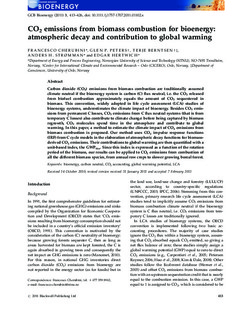CO2 emissions from biomass combustion for bioenergy: atmospheric decay and contribution to global warming
Cherubini, Francesco; Peters, Glen Philip; Berntsen, Terje Koren; Strømman, Anders Hammer; Hertwich, Edgar G.
Journal article, Peer reviewed
Published version
Permanent lenke
http://hdl.handle.net/11250/2479928Utgivelsesdato
2011Metadata
Vis full innførselSamlinger
- Journal articles [478]
Originalversjon
Global Change Biology Bioenergy. 2011, 3 (5), 413-426. 10.1111/j.1757-1707.2011.01102.xSammendrag
Carbon dioxide (CO2) emissions from biomass combustion are traditionally assumed climate neutral if the bioenergy system is carbon (C) flux neutral, i.e. the CO2 released from biofuel combustion approximately equals the amount of CO2 sequestered in biomass. This convention, widely adopted in life cycle assessment (LCA) studies of bioenergy systems, underestimates the climate impact of bioenergy. Besides CO2 emissions from permanent C losses, CO2 emissions from C flux neutral systems (that is from temporary C losses) also contribute to climate change: before being captured by biomass regrowth, CO2 molecules spend time in the atmosphere and contribute to global warming. In this paper, a method to estimate the climate impact of CO2 emissions from biomass combustion is proposed. Our method uses CO2 impulse response functions (IRF) from C cycle models in the elaboration of atmospheric decay functions for biomass-derived CO2 emissions. Their contributions to global warming are then quantified with a unit-based index, the GWPbio. Since this index is expressed as a function of the rotation period of the biomass, our results can be applied to CO2 emissions from combustion of all the different biomass species, from annual row crops to slower growing boreal forest.
